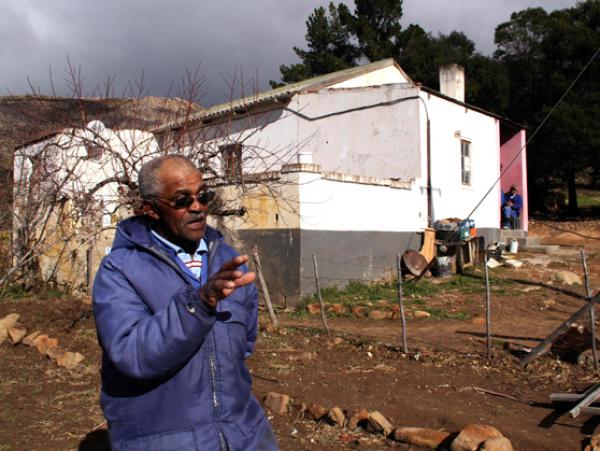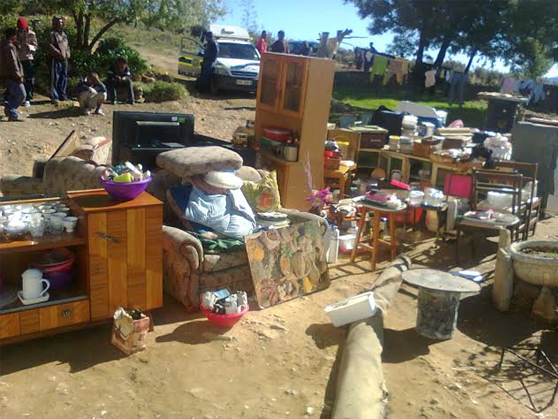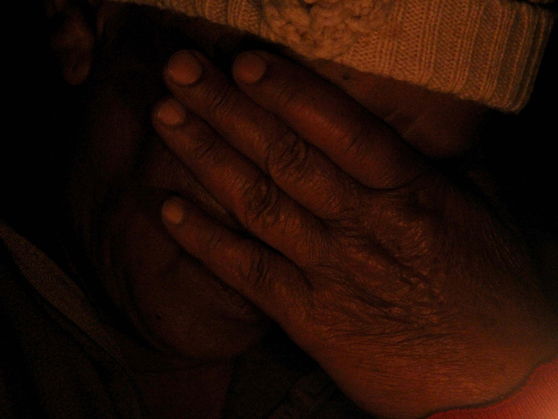

Living in constant anticipation of another court sanctioned eviction, Andries Joostenberg has vowed to stand firm and resist being thrown off the land he has called home for 50 years. Photo by Daneel Knoetze.
25 July 2014
Darkness falls on the Koo valley. Andries Joostenberg, 63, and his son hang up their axes, stack the last logs of cut wood and trudge indoors. The temperature drops. In the farm cottage’s kitchen a family huddles in semi-darkness around a wood stove. The electricity has been cut, so too the water: final instalments in a siege designed to drive Andries off the land.
There is no 7de Laan or television news tonight. A candle on the kitchen table illuminates half a dozen faces: three generations of Joostenbergs. It is a silent, sombre, intimate scene, uncomfortable for an outsider. Andries’ wife buries her face in the palm of her hand and weeps. The nebuliser she needs to manage her asthma cannot run without electricity.
It is Thursday evening, the deadline set by the court for the couple to vacate is noon on Friday. Yet, no boxes or suitcases have been packed. On the eve of his greatest tribulation in 50 years on Langdam farm, Andries and his family stand firm.
“They have money and lawyers, but my family’s bond is stronger than that stuff,” Andries’s granddaughter Itha Seherie, 19, whispers. “This is our home. How can you break a home that is as strong as ours?”
For Shirley Davids, a regional organiser for farmworkers’ union Csaawu, the case is symbolic of farm evictions throughout the province, where farm owners use their power, money and access to the courts to fight the Constitutional right to housing of tenants living on their land. A failure to protect the Joostenbergs here is a setback for the tenure rights of farmworkers in general, she says.
As such, the union has rallied around the Joostenbergs and launched a public campaign for a boycott of Langdam’s self catering cottages. The eviction order, too, is set to be challenged. Csaawu points to the Extension of Security of Tenure Act which gives special habitation rights, until death, to long term occupiers over the age of 60, provided they have have lived on the land for at least ten years.
Professor Ruth Hall, researcher for Institute for Poverty, Land and Agrarian Studies, agrees that this right is inalienable. She says that, in the case of the Joostenbergs, it is the farmer who has broken the law - that the cutting of basic services such as water constitutes an “illegal eviction”, even if the tenants continue to occupy the land.
Langdam guest farm lies in the picturesque Koo region, outside Montagu. The valley, famous for leisurely tractor rides up the peaks of the Langeberg mountains and scenic country surrounds, is a jewel of winelands tourism.
The farm’s accommodation is relatively new, but – with offers of cheese and wine tasting, horse riding, bird watching and seasonal fruit picking – Langdam-in-Koo appeals to tourists. Escape from “the stresses of everyday life” beckons the farm’s online brochure. Yet, behind the luxury cottages with their verandas overlooking the valley, and the peaceful country living is a community in ruin. Families who once found sustenance in meagre wages for picking peaches and apples on Langdam have had to pack up and leave: Beekman, Davids, Plaatjies and Van Wielig.
“My heart breaks when I think of my neighbours – how their children played with my own in the yard; the community that we once had,” says Lea Joostenberg, 58, Andries’ wife and the last remaining matriarch of Langdam’s fruit pickers.
“Now we see rich people coming here from the city. They don’t realise where they are staying – in the homes of families who left with great sorrow in their hearts.”’
But Glenda Brummer, the farm’s owner since 2008, paints a picture of the Joostenbergs as violent, disingenuous and dangerous. She speaks not of a souring relationship with Andries, but of one that was sour from the very outset. It is his insubordination and incitement of other workers, for instance, to which she attributes the failure of Langdam’s fruit farming and the resort to self catering accommodation.
Andries, already on a final warning, was found guilty of “gross disrespect” in 2012 and fired. The eviction, and two years of court proceedings that preceded it, are necessary safety precautions recommended to her by neighbouring farmers, Brummer says, after Andries threatened to kill her.
The Joostenbergs, who say they have no alternatives as well as an ancestral claim to the land, have resisted requests by Brummer to follow their neighbours off the land. In the process, Andries has seen a lifetime of accumulation –livestock, a commercial vegetable garden and a firewood business– laid to waste in a few short years. The stock disturbed the peace and quiet sought by paying guests to the farm, Andries was told. The vegetables consumed too much of the farm’s water. The five head of cattle were slaughtered. Excess vegetables for the market were uprooted.
Finally, on 2 July, a sheriff with an eviction order from Montagu Magistrate’s Court arrived at the home. The family had known an application was before the court, but the eviction was sudden and unexpected. Neither Lea nor Andries was home. Cellphone footage taken by their granddaughter Itha shows an eight year old boy, Alistair Seherie, sitting on the patio, alone. He is watching five men empty his grandmother’s kitchen.
When Andries returned home the doors were padlocked. That night, and the next, the family slept outside, in temperatures near freezing, among their possessions – cupboards, tables, packets of food roughly strewn, piles of clothing. On the third day the family re-occupied the house. Brummer claims they did so by breaking in. Andries denies this, saying that the farm’s foreman removed the padlocks. Regardless, he now stands charged with breaking and entering before the local magistrate.

The Joostenbergs’ furniture amongst which they slept for two wintery nights after a sheriff with an order from Montagu Magistrates Court evicted them on 5 July. Photo supplied.
It was in 1964 that Job Geduld arrived on Langdam farm in search of work for himself, his wife, and two adopted teenage sons: Andries and Jan Joostenberg. So began nearly five decades of entanglement between the Joostenbergs, Langdam and the De Kocks who had owned the farm for at least 100 years before then.
By candlelight Andries and Lea speak about raising a family on Langdam. Their story starts several decades ago with 24-year-old Andries courting and falling in love with 19-year-old Lea on a neighbouring farm. They had a child, moved out of their parental homes, married and settled in a two-room cottage on Langdam. Lea giggles when she recalls the simplicity of their beginnings: no water, no toilet, no lights, a straw bed, a “harde lewe [hard life]”. The irony of their current destitution cuts the chuckle short.
“Kind of like you see us living now,” Lea mumbles.
In the old days, as now, a farm hand’s scope for promotion was narrow.
“In the city, you can get a better job. You get promoted,” Andries explains.
“It is not like that out here. You are a farmworker your life long. Your life is the farm. But, you can dream. One day, you may have a bigger home, a few cows, pigs and a way to provide for your family that isn’t just bound to your pay at the end of the week.”

Lea Joostenberg buries her face in her hand on the night before the anticipated eviction of her family from their home on Langdam guest farm where they have lived since 1988. Photo by Daneel Knoetze.
It is a dream that Andries, with the help of farmer Andre de Kock (who sold Langdam in 2008), could realise. His family has lived in the house from which they stand to be evicted since 1988. It is secluded, more than a kilometre from the other cottages and main farm house, and provided the Joostenbergs with a degree of independence through stock rearing and horticulture.
Andries’ relationship with the De Kocks is typical of apartheid labour relations throughout rural South Africa, says Hall. So too is the eviction, in post-apartheid South Africa.
“Of course there were major abuses meted out on farmworkers, but farmers also adopted a paternalistic approach in providing for their staff,” explains Hall. “Privileges in terms of housing, services and other assistance, were however always seen as a favour, not as an entitlement.”
With the advent of democracy, progressive labour legislation, the Constitution’s Bill of Rights, and greater critique of the country’s inequality, that paternalism was challenged and eroded. In the wake of the violent farmworkers’ strike of December 2012 and January 2013, farmers questioned why they should continue providing for their workers after Labour Minister Mildred Oliphant announced a 52% wage hike for the sector.
Farmers complained that if they paid more in cash they would have to charge workers for rent, water, electricity and other costs, a threat which Csaawu and other unions say has been implemented.
It’s within this context that farm evictions should be seen, Hall says, especially in cases where new owners take over farms with existing tenants.
“New owners often struggle to understand that a farm worker does not live on a farm to be close to their place of work. The farm is their life, not just a workplace. They often have nowhere to go, no chance of survival outside that context,” she adds.
Although Brummer claims she has the support of her neighbouring farmers, at least one has spoken out in support of the Joostenbergs and the “old ways”. Anton Burger, 81, a relative of the De Kock family and owner of the farm Concordia, supports Andries’ claim of “lifelong habitation rights” granted to him by the De Kocks.
“This is not how we treat people,” Burger says. “What’s happening to Andries is not fair. I myself have families on my farm who no longer work for me. How can I kick them off? I know well that they have nowhere to go.”
Last Friday dozens of Csaawu members gathered outside the Joostenbergs’ home to face down the police, who were set to arrest Andries for trespassing. Then Brummer’s lawyers agreed to another, final week grace period before the police would be called. Csaawu claimed this as a victory. But Andries and his family continue to relieve themselves in the bushes, cook on an open fire, cart bottles of water to the house from a spring and wait for another court-ordered eviction.
“Living like this is the price to pay for standing firm. But, we are willing. This is our home,” Andries says.